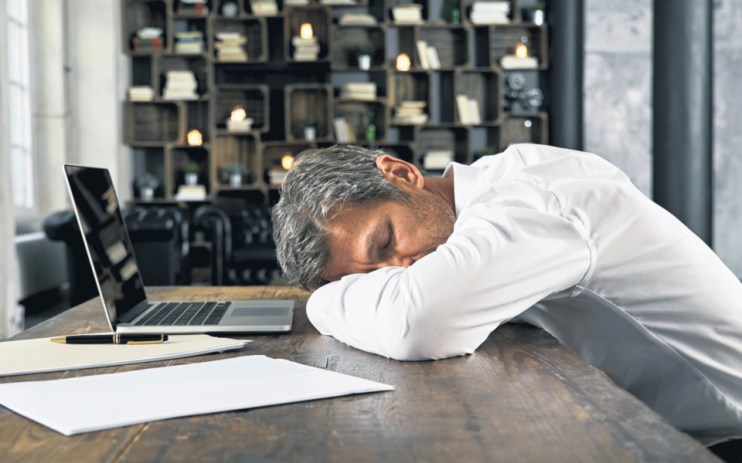Fitness advice: How to improve your sleep routine

The temperature is dropping, the sunshine is vanishing and it’s dark by the time you’ve left the office. Now more than ever it’s important to make sure you’re getting a good night’s sleep, as gloomy weather, limited daylight and seasonal illnesses all conspire to take advantage of your weakened defences. And poor sleep can cause all kinds of problems, from short-term irritability and lack of concentration to long-term mental health issues.
Most of us would admit that we could be sleeping better, but it’s easier said than done. To help you out, here are some top tips to improve your snoozing and boost your health.
Light therapy
Good sleep habits start long before bedtime. London receives less than eight hours of daylight in the depths of winter – and hardly any of it direct sunlight – so light therapy is a great place to turn for a mental pick-me-up, and will help regulate your bodyclock in the absence of natural light.
Seasonal affective disorder is a type of depression common during darker months, with symptoms that include a persistent low mood, feeling more lethargic and sleepy during the day, sleeping for longer than normal and finding it hard to get up in the morning. The causes are still not fully understood, but the leading theory suggests that the body’s production of melatonin and serotonin – two important neurotransmitters that affect mood and sleep – may be diminished by the lack of sunlight.
There are alarm clocks that light up your room gradually to replicate the sunrise, making it easier to wake in the morning. But for a more intense light therapy, consider a Lumie Vitamin L sleep lamp (pictured). These operate at the same wavelengths as natural, outdoor light, and claim to lift your mood, boost alertness and help you to feel more energised.
Nasal Breathing
Snoring affects not just the sleep of those next to us, but also our own, and it’s often caused by breathing through our mouths. Our noses are designed to filter the air we breathe, but when we breathe in through our mouths we bypass this whole filtering process, which can cause problems.
Sleep apnoea occurs when the walls of your throat relax and obstruct your breathing. Many of us don’t even realise we have it, but if you snore often and feel tired during the day, it could be caused by this kind of interrupted sleep. I suffer from this condition but had no idea until recently, when I started monitoring my sleep and discovered that it was very poor quality.
It had been going on for so long, I didn’t even feel bad after a terrible night’s sleep: it just felt normal.
A strategy recommended by a number of sleep experts is to tape your mouth shut whilst sleeping. While it may sound scary, this simple measure will force your body to breathe through the nose rather than through the mouth, alleviating snoring and disruption to sleep. Those who really struggle with sleep can notice a change in sleep quality from the first night. I tried it and it works wonders, with my quality of sleep is already improving.
Caffeine
One of the biggest culprits of sleep deprivation is coffee. The city is renowned for consuming too much of it and this will no doubt affect your sleep. The problem with caffeine is that we tend to get ourselves into a cycle of dependency: we drink it because we are tired, which then causes more tiredness, requiring more coffee. Repeat ad infinitum.
Caffeine blocks natural adenosine build up and has a half life of around 6 hours. If possible, avoid drinking any after 2pm. Even people who claim their sleep is unaffected often suffer undetected consequences, with lab-testing often showing up erratic and interrupted sleep patterns in heavy caffeine users.
Switch off before bed
Switching off in the evening is crucial: we all know it but very few do much about it. We take our work stress home and go to bed with a super-active mind. Clear half an hour before you go to sleep to unwind. Put your phone away: blue light has been proven to interrupt sleep. Set up a charging station in another room and buy a cheap alarm clock to wake you up in the morning. If you drift off listening to music or podcasts, consider buying a Google Home or Amazon Alexa so you’re not tempted to pick up a screen. Try meditation before bed: I’m a huge convert and have been introducing it to as many of my clients as I can; just one of its amazing benefits is improved sleep.
Treat yourself
How often do you treat yourself to a massage? Most of us spend far too much time working – or worrying work – and nowhere near enough taking care of ourselves.
Self care treatments are a great way of getting rid of mental and physical tension, allowing you to recover both physically and mentally.
At No1 Fitness we have a recovery room at both studios where clients can lie down for 30 minutes. We connect them to compression boots (NormaTec), which helps with circulation. People who sit down a lot or travel for long periods benefit from this just as much as people who are actively training.
When you add recovery strategies into your routine, it helps the body to switch off. I encourage my clients to book at least two of these treatments a month and the feedback has been fantastic. It’s a smart way to relax and sets you up for a sounder sleep.
• Harry is the founder of City gym No1 Fitness. To book a consultation go to no1fitness.co.uk or call 020 7403 6660